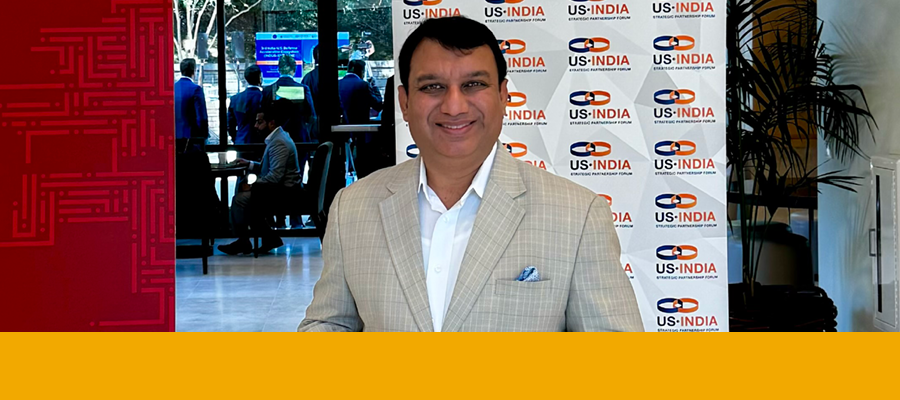Building innovation with purpose

Enlightened speaks with award-winning alumnus Dr Nikhil Agarwal (PhD Science, Technology and Innovation, 2018) about the power of ideas, policy and entrepreneurial thinking.
When Dr Nikhil Agarwal walked through the gates of the University of Edinburgh to begin his PhD in Science, Technology and Innovation Studies, he wasn’t just enrolling in an academic programme – he was stepping into a new way of seeing the world. “Edinburgh gave me the lenses through which I now view everything – critically and compassionately,” he says.
Originally from India, Nikhil was drawn to Edinburgh for its interdisciplinary STIS programme and the way it mirrored his own fascination with how science and innovation shape society. The city itself, with its striking juxtaposition of ancient cobblestones and cutting-edge research, became the backdrop to a deeply formative chapter in his life. “The culture of respectful debate, the quiet hours in the library, and even the long walks up Arthur’s Seat – they all became part of who I am,” he says.
Since graduating in 2018, Dr Agarwal’s impact has spanned government, academia, and entrepreneurship. Now Managing Director of the Foundation for Innovation and Technology Transfer (FITT) at IIT Delhi – India’s leading tech incubator – he’s helping shape the future of Indian innovation, from grassroots ideas to global partnerships.
Innovation for the many, not the few
“India is bursting with potential,” says Nikhil. “Whether it’s a rural innovator creating a low-cost farming solution or a student with a bright idea in a hostel room, there’s brilliance everywhere. But access to the right support can make all the difference.”
It’s that drive – to democratise innovation – that has guided his career. From crafting India’s first state-level startup policy in Andhra Pradesh to leading IIT Kanpur’s technology incubator supporting hundreds of startups, his mission has remained clear: to create inclusive ecosystems that empower ideas rooted in real-world needs.
One standout moment came during the COVID-19 pandemic, when a health-tech startup incubated under his leadership developed an affordable ventilator. “They came from modest backgrounds,” Nikhil recalls, “but their solution saved lives. That’s the kind of impact that keeps me going.”
At IIT Delhi, he’s taken that commitment even further, co-launching UnnatiAI – an AI-for-Good accelerator in partnership with Microsoft. Startups in the programme are using artificial intelligence to tackle social challenges, from rural skills training to smart agriculture. “These innovations aren’t just for India – they’re for the world,” he says.
Across borders and sectors
Dr Agarwal’s career has seen him as an academic, a policy architect, an entrepreneur and a mentor. He’s equally at home in government corridors and startup demo days. “Each role informs the other,” he explains. “Academia teaches me to ask the right questions. Policy gives me the tools to drive change. Entrepreneurship keeps me grounded in real-world problem-solving.”
As he looks to the future, Nikhil sees international collaboration as essential – particularly between India and the UK. “There’s a powerful synergy. India brings scale and frugal innovation; the UK offers deep research and robust policy frameworks. Together, we can co-create solutions for both developed and emerging contexts.”
FITT is already working to build cross-border accelerators and student fellowships, and Nikhil is eager to deepen these ties. “We’re just scratching the surface,” he says.
Recognition, reflection and what comes next
In 2025, Nikhil was honoured by the National Indian Students and Alumni Union UK , winning the Education, Science and Innovation award- a moment he describes as “deeply humbling.” For him, the award symbolises a full-circle journey. “To be recognised by the very community I was once part of as a student walking the streets of Edinburgh – it’s an incredible feeling.”
And he’s not slowing down. He’s currently writing a book titled Entrepreneurship Thinking, exploring how entrepreneurial mindsets are reshaping not just startups but also policy, academia, and public institutions. He’s also expanding FITT’s support for frontier technologies – from frugal drones to quantum sensors – many of which are now being piloted in Africa and Southeast Asia.
“We’re scaling innovations that matter,” he says. “Not just for India, but for humanity.”
Above: watch as Nikhil is honoured by the National Indian Students and Alumni Union UK
Words for the next generation
For students and recent graduates keen to follow in his footsteps, Nikhil has simple but powerful advice: stay curious. “Read widely. Build things. And don’t be afraid to fail early. Innovation isn’t just about technology – it’s about mindset.”
He also urges young entrepreneurs to stay rooted in their purpose, particularly in the face of uncertainty. “The startup journey is lonely, but it doesn’t have to be isolating. Reach out. Ask for help. That’s why incubators like ours exist—we’re here to be your cushion and your springboard.”

